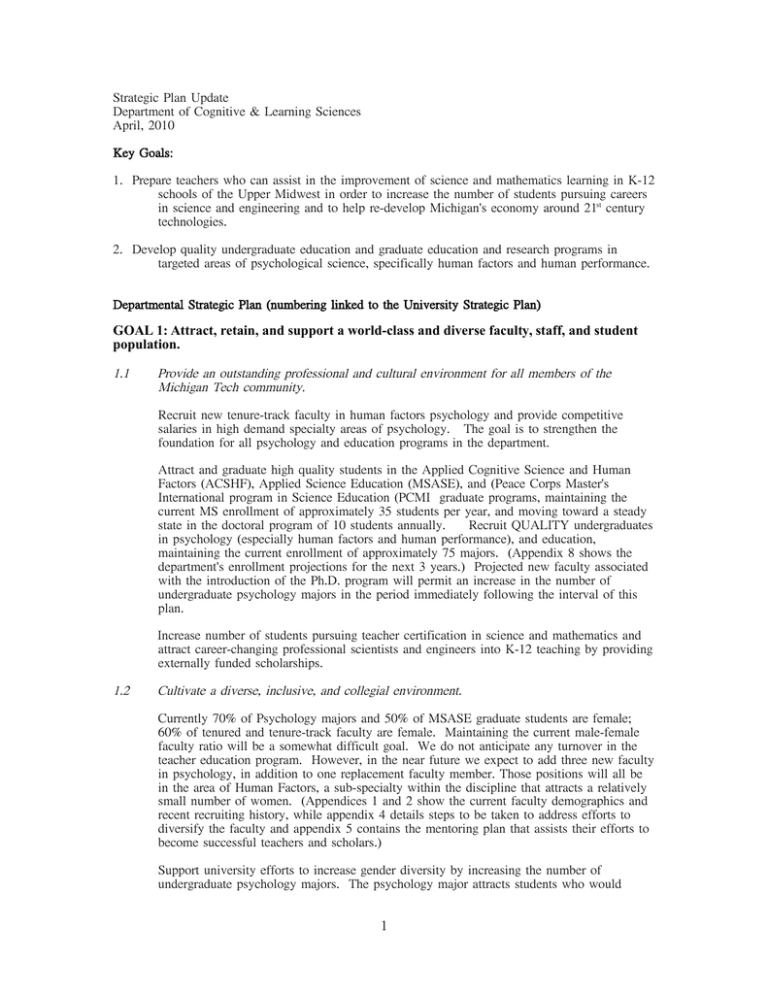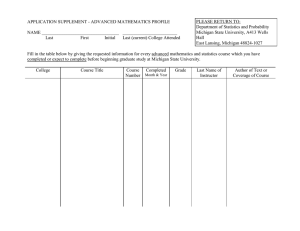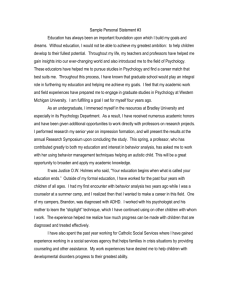Strategic Plan Update Department of Cognitive & Learning Sciences April, 2010 Key Goals:
advertisement

Strategic Plan Update Department of Cognitive & Learning Sciences April, 2010 Key Goals: 1. Prepare teachers who can assist in the improvement of science and mathematics learning in K-12 schools of the Upper Midwest in order to increase the number of students pursuing careers in science and engineering and to help re-develop Michigan's economy around 21st century technologies. 2. Develop quality undergraduate education and graduate education and research programs in targeted areas of psychological science, specifically human factors and human performance. Departmental Strategic Plan (numbering linked to the University Strategic Plan) GOAL 1: Attract, retain, and support a world-class and diverse faculty, staff, and student population. 1.1 Provide an outstanding professional and cultural environment for all members of the Michigan Tech community. Recruit new tenure-track faculty in human factors psychology and provide competitive salaries in high demand specialty areas of psychology. The goal is to strengthen the foundation for all psychology and education programs in the department. Attract and graduate high quality students in the Applied Cognitive Science and Human Factors (ACSHF), Applied Science Education (MSASE), and (Peace Corps Master's International program in Science Education (PCMI graduate programs, maintaining the current MS enrollment of approximately 35 students per year, and moving toward a steady state in the doctoral program of 10 students annually. Recruit QUALITY undergraduates in psychology (especially human factors and human performance), and education, maintaining the current enrollment of approximately 75 majors. (Appendix 8 shows the department's enrollment projections for the next 3 years.) Projected new faculty associated with the introduction of the Ph.D. program will permit an increase in the number of undergraduate psychology majors in the period immediately following the interval of this plan. Increase number of students pursuing teacher certification in science and mathematics and attract career-changing professional scientists and engineers into K-12 teaching by providing externally funded scholarships. 1.2 Cultivate a diverse, inclusive, and collegial environment. Currently 70% of Psychology majors and 50% of MSASE graduate students are female; 60% of tenured and tenure-track faculty are female. Maintaining the current male-female faculty ratio will be a somewhat difficult goal. We do not anticipate any turnover in the teacher education program. However, in the near future we expect to add three new faculty in psychology, in addition to one replacement faculty member. Those positions will all be in the area of Human Factors, a sub-specialty within the discipline that attracts a relatively small number of women. (Appendices 1 and 2 show the current faculty demographics and recent recruiting history, while appendix 4 details steps to be taken to address efforts to diversify the faculty and appendix 5 contains the mentoring plan that assists their efforts to become successful teachers and scholars.) Support university efforts to increase gender diversity by increasing the number of undergraduate psychology majors. The psychology major attracts students who would 1 otherwise not attend a technological university, adding diversity of viewpoint and outlook to the student body. Approximately 70% of Psychology majors are female. 50% of Applied Science Education graduate students are female. We will focus additional resources on undergraduate recruitment. A new brochure for the Psychology program is in preparation. Faculty will give increased attention to school visits and phone calls to applicants who have been accepted to Michigan Tech, strategies that have been very effective in the past. And the department will continue to utilize King-Park-Chavez funds to bring diverse external speakers to campus, address undergraduates, and serve as role models. (Appendix 3 shows current students demographics and appendix 4 contains worksheets detailing efforts to broaden the diversity of CLS students. Increase number of underrepresented students in science and mathematics teaching by developing partnerships with community colleges and urban school districts. Recruitment efforts in support of the Noyce Scholarship program, funded by NSF, have focused on community college students, as well as existing Michigan Tech undergraduates. Because community college enrollments are fairly diverse, we anticipate that this will result in a more diverse population of pre-service teachers. The Noyce program has also resulted in a partnership with Saginaw Public Schools and Grand Rapids Public Schools, which both have very diverse enrollments. An Improving Teacher Quality grant from the Michigan Department of Education has brought Michigan Tech faculty together with K12 teachers in the Saginaw area, thanks to the efforts of John Irwin (PI) in the School of Technology and Kedmon Hungwe (co-PI) in CLS. The Michigan Teacher Excellence Program (MiTEP), funded by NSF (Bill Rose, Geological and Mining Engineering and Sciences, PI; Brad Baltensperger, C&LS, co-PI) works with teachers and administrators in the Grand Rapids Public Schools. 1.3 Provide exceptional infrastructure. The department is poised to move into new space in the Meese Center. This will allow development of high quality behavioral science research space in order to attract outstanding faculty in Psychology. Development of this space will require external funding for research space improvements and equipment acquisition. An NIH Infrastructure proposal has been submitted and scored well; as of May 2010, we are awaiting a decision. Learning sciences faculty also require improvements in research space, although overlap in research activities allows sharing of facilities with human factors faculty. GOAL 2: Deliver a distinctive and rigorous discovery-based learning experience grounded in science, engineering, technology, sustainability, the business of innovation, and an understanding of the social and cultural contexts of our contemporary world. Maintain a technologically sophisticated teacher education laboratory and provide a hightech teaching facility for psychology courses. Implement Ph.D. program in Applied Cognitive Science & Human Factors. Continue to deliver high quality teacher professional development programs in science and mathematics. Attain accreditation by Teacher Education Accreditation Council (TEAC). GOAL 3: Establish world-class research, scholarship, innovation, and creative work that promotes sustainable economic and social development in Michigan, the nation, and the world. 3.1 Improve our stature as a research university and Ph.D. granting institution. 2 Implement Ph.D. program and associated research in Applied Cognitive Science & Human Factors. This is an interdisciplinary area of psychology with strong potential for connections to Electrical and Computer Engineering, Computer Science, Mechanical Engineering, Biomedical Engineering, Civil Engineering, and Exercise Science. To support graduate students and advance knowledge, external funding for research in applied cognitive science and human factors should increase to at least $400,000 per year by 2012-13. Maintain high level of external funding for K12 education programs. Continue to attract external funding to support graduate students and teacher professional development programs. (Appendix 9 includes data on patterns of external funding for all CLS activities combined.) Science and Mathematics Learning is an interdisciplinary area that links education faculty with faculty in all science disciplines, mathematics, engineering, and forestry for research and professional development purposes. 3.2 Promote economic and social development and innovation in Michigan, the nation and the world. Work with state agencies, other institutions, and funding agencies to increase the number of outstanding K-12 science and mathematics teachers. The Division of Teacher Education continues serve as the university's link to K-12 education locally, regionally, and statewide. The department maintains contact with the Michigan Department of Education and with other teacher education institutions through membership in the Michigan Education Deans' Council and MACTE (Michigan Association of Colleges of Teacher Education). The department chair is the university's representative at monthly meetings of the Upper Peninsula Center for Education Development (UPCED), which brings together the seven ISD's and the three state universities of the region. The department will continue its active involvement in the entrepreneurship activities related to K-12 schools through regular meetings with the ISD superintendent, the CEO of the SmartZone, and the president of the university. The department has actively engaged the local K-12 community through teacher professional development, meetings with area principals and superintendents, and the department's Advisory Council. 3.3 Address societal needs through global partnerships. Expand enrollment in Peace Corps Master's International Program in Science Education. 3 Donor Opportunities: Focus areas: Science and mathematics learning to improve Michigan's economy. Human factors and human performance psychology. Opportunities: Scholarships for students to study science and mathematics education at MTU. Seed grants to support a simulated reality laboratory at MTU. Endowed chair in human factors psychology. 4




